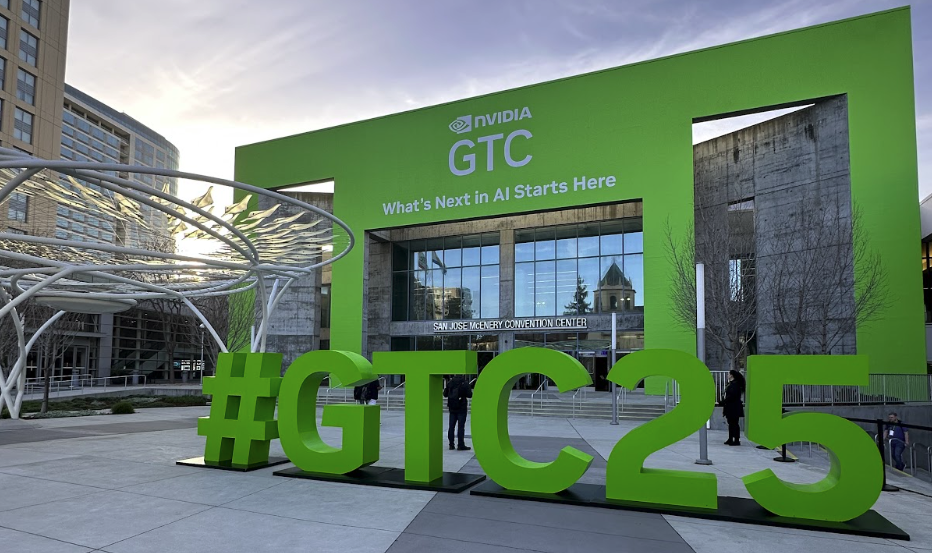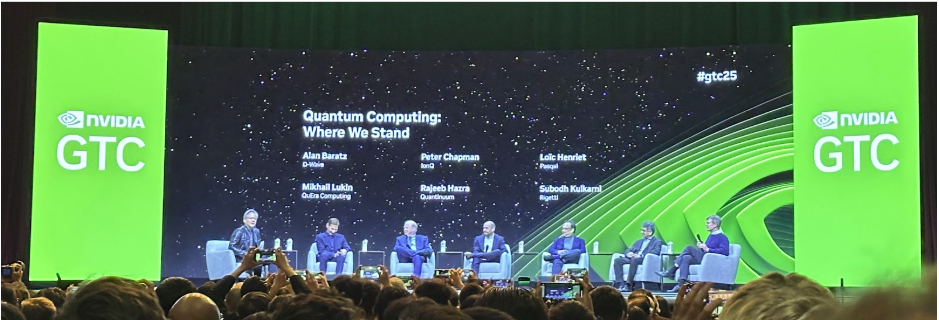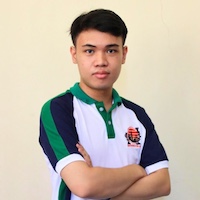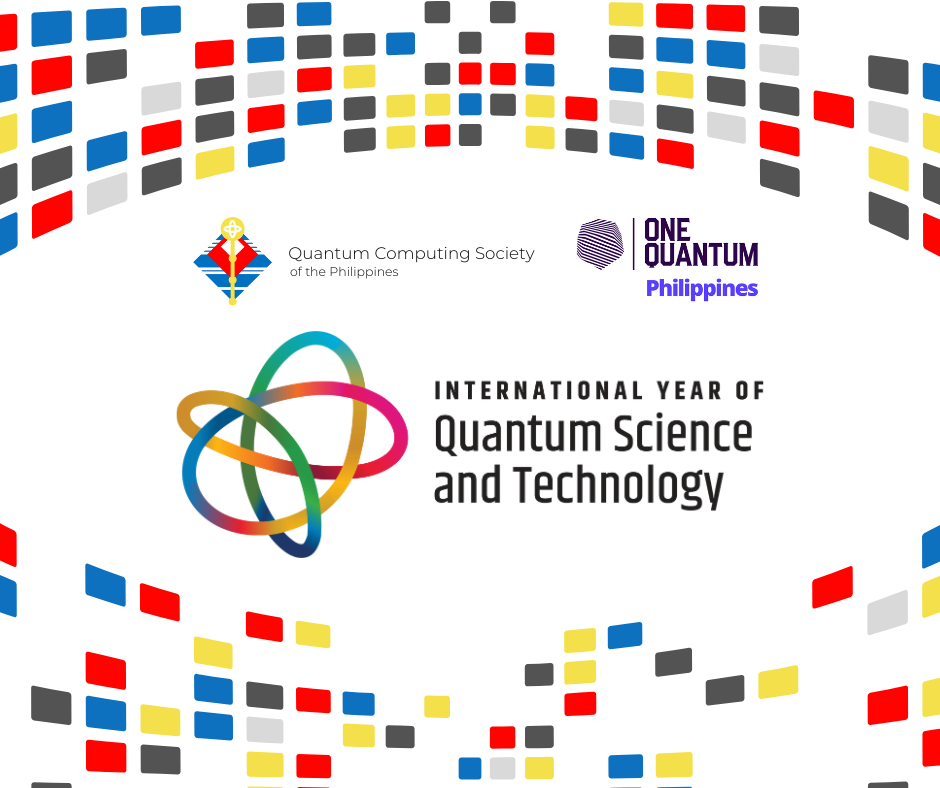NVIDIA has long been a leader in showcasing the latest innovations in accelerated computing through its annual GPU Technology Conference (GTC), a global platform for breakthrough technologies. Since its inception in 2009, GTC has been a hub for advancements in AI, deep learning, and graphics. This year’s GTC was held at the McEnery Convention Center in San Jose, California, USA. At GTC 2025, NVIDIA made a historic move by launching its first-ever Quantum Day, timed perfectly with the International Year of Quantum. This marks a pivotal moment for the company as it sets its sights on the growing field of quantum computing, signaling a shift toward integrating quantum technology with classical computing.
 |
|---|
| Photo Courtesy: Dylan Josh Lopez |
A Historic Panel Discussion: Challenges and Opportunities in Quantum Computing
The Quantum Day kicked off with a high-profile panel discussion led by NVIDIA CEO Jensen Huang. Before the panel discussion, Jensen announced that NVIDIA is establishing the NVIDIA Accelerated Quantum Research Center (NVAQC) in Boston to drive advancements in quantum computing by integrating quantum hardware with AI supercomputers, partnering with QuEra and Quantinuum. This collaboration with leading researchers and companies will focus on solving key challenges in quantum computing, such as qubit noise and quantum error correction while promoting the development of practical quantum applications. The panel featured executives from leading quantum computing companies partnered with NVIDIA, including IonQ, Quantinuum, Pasqal, D-Wave, QuEra Computingi, Rigetti, Alice & Bob, Atomic Computing, Infleqtion, PsiQuantum, Quantum Circuits, SEEQC, AWS Quantum Computing, and Microsoft Quantum.
 |
|---|
| Photo Courtesy: Dylan Josh Lopez |
The discussion delved into the challenges and limitations of quantum computing, exploring scalability issues, latency, and throughput bottlenecks in quantum processing units (QPUs). The panel also addressed the positioning of quantum computers concerning traditional computing devices. Jensen pointed out that, unlike the fast and efficient classical computers that run applications like Excel, quantum computers are not designed for such tasks. Instead, quantum processors are specialized tools for:
- Boosting fundamental scientific research.
- Solving complex industry-specific problems.
- Complementing classical computing systems, such as CPUs and GPUs, rather than replacing them entirely.
This nuanced perspective is crucial for understanding the true potential of quantum computing.
NVIDIA’s Quantum Developer Day: Showcasing Innovation
In the afternoon, the NVIDIA Quantum Developer Day showcased cutting-edge applications and innovations from NVIDIA’s partners using CUDA-Q and NVIDIA’s powerful hardware platforms, including DGX SuperPods, Grace Hopper, and Blackwell GPUs.
Key Highlights:
- Infleqtion: Demonstrated quantum-inspired machine learning applications used by the US Army and Navy for tracking applications.
- Hewlett-Packard Enterprise: Unveiled a quantum computing architecture designed for integration into next-generation data centers.
- qBraid: Presented a quantum and accelerated computing workflow for protein research, specifically in understanding Alzheimer’s disease.
- Quantum Machines: Showcased new methods for calibrating multi-qubit circuits in a hybrid QPU-GPU environment.
- MITRE: Revealed advancements in quantum sensor design optimized using quantum computing.
- Keio University: Presented enhanced quantum phase estimation algorithms for quantum chemistry.
- Quantum Brilliance: Discussed their latest virtual QPUs (vQPUs) as part of their development stack.
These sessions highlighted how quantum computing is making strides in both fundamental science and practical applications, providing a glimpse of the transformative potential of quantum technologies.
Networking and Collaboration: Building the Quantum Ecosystem
GTC 2025 also provided invaluable networking opportunities, allowing professionals to engage in Group Discussions and Brainstorming sessions through Braindate. These sessions were crucial for exchanging ideas and collaborating on overcoming the quantum computing industry’s many challenges. Attendees were able to connect with like-minded individuals and discuss the future of quantum computing.
What’s Next: Quantum Projections for GTC 2026
As the panel discussions wrapped up, Jensen Huang and other experts shared their predictions for the future of quantum computing. Looking ahead to GTC 2026, the following expectations emerged:
- More Industry-Specific Applications: Quantum computing will continue to solve business and industry-specific problems.
- Increased QPU Integration: Quantum processing units will become more integrated into data center infrastructure, driving broader adoption.
- AI Evolution: Quantum computing will play a pivotal role in advancing agentic AI, physical AI, and Artificial General Intelligence (AGI).
- Error Correction Advancements: Significant progress in error correction techniques will make quantum computations more reliable.
- Quantum Startups: Expect an influx of quantum-focused startups as more companies enter the space and showcase their innovations.
These predictions point to a rapidly evolving quantum landscape, with industry leaders confident that quantum computing will be a transformative force in the coming years.
“The idea of a quantum computer is you want to build a computer that replaces computing. But as a QPU that’s added to a GPU to a CPU to extend classical computing to do things that otherwise cannot.” – Jensen Huang, CEO, NVIDIA
Pinoy Pride at GTC: Filipino Talent in Quantum Computing
Poster sessions in GTC were launched last March 17 before Jensen Huang’s Keynote. Ph.D. Student Dylan Josh Lopez from Chung Yuan Christian University, who is also the Director for Partnerships and Collaboration at the Quantum Computing Society of the Philippines (QCSP), presented a poster titled “Multi-Location Solar Irradiance Forecasting Using Hybrid Quantum Neural Networks for Renewable Energy Assessment,” which is available together with other featured work on the GTC Poster Gallery. QCSP is always on the lookout for Filipino representation in the global quantum community. At GTC 2025, QCSP had the opportunity to meet with Dennis Baleta, the Senior Vice President of Engineering at iQore, a quantum computing startup.
About iQore:
iQore develops software solutions that optimize quantum circuit execution, improving qubit coherence and computational efficiency without requiring hardware modifications. Their participation at GTC 2025 reflects the growing influence of Filipino talent in the rapidly advancing field of quantum computing.
Now, how about the Philippines?
The Philippines must keep pace with global advancements in quantum computing. As quantum computing continues integrating with AI technologies, industries in the Philippines—especially telecommunications, banking, and chemical sectors—will face disruptions and opportunities for technological breakthroughs. NVIDIA’s involvement in quantum computing signals a major shift, with the potential to bolster innovation in communication, storage, and processing. The country must prepare for these advancements, adopting quantum computing to stay competitive in the global tech landscape.
NVIDIA’s Quantum Day and the Road Ahead
The launch of NVIDIA’s first Quantum Day at GTC 2025 marks a milestone in the advancement of quantum computing. With the integration of quantum and classical computing, the possibilities for innovation are limitless. As the quantum landscape continues to evolve, businesses and institutions worldwide must adapt to harness the power of quantum technologies. For the Philippines, the future of quantum computing offers a unique opportunity to leap forward and play a significant role in the global quantum ecosystem.
 Jabez Ayson
Jabez Ayson 
 The QCSP leads the Philippines towards the International Year of Quantum
The QCSP leads the Philippines towards the International Year of Quantum